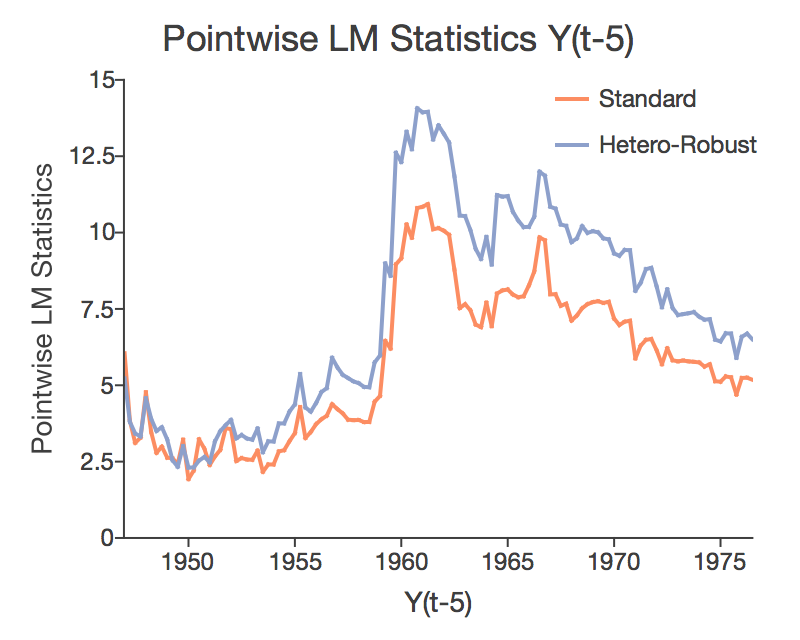Introduction
This example follows the empirical example found in Hansen (1996) and estimates a threshold model for quarterly GNP growth rates. The data file "gnp.dat" contains seasonable adjusted GNP for 1947 to 1990 and is transformed into annualized quarterly growth rates.
Load data
This example loads the data using the GAUSS function loadd. The function loadd utilizes the GAUSS formula string syntax and allows users to load and transform specific variables directly from the dataset.
new; library tsmt; /* ** Real GNP data ** Seasonally adjusted and transformed in annualized quarterly growth rates ** 1947-1990 */ // Load 'real_gnp' variable and perform 'ln' transformation dataset = getGAUSSHome() $+ "pkgs/tsmt/examples/gnp_4790.csv"; ln_gnp = loadd(dataset, "ln(real_gnp)"); y = (ln_gnp[2:rows(ln_gnp)] - ln_gnp[1:rows(ln_gnp)-1]) * 400;
Set Up the Estimation
The tarControl structure is used to control the model characteristics. This includes the number of lags considered, which lags to omit from the test, the number of replications, and graph features:
// Declare the structure struct tarControl t_ctl; // Fill 't_ctl' with default settings t_ctl = tarControlCreate(); // Maximum number of lags considered t_ctl.p = 5; // Lags to omit from the test // Consider lags 1, 2 and 5 t_ctl.omit = { 3 4 }; // Number of replications for Monte Carlo t_ctl.rep = 5000; // Data start date and frequency t_ctl.dstart = 1947; t_ctl.freq = 4;
Estimate the Model
All output from the tarTest function can be stored in a tarOut output structure.
// Declare 't_out' to be a tarOut structure // to hold the estimation results struct tarOut t_out; // Perform estimation t_out = tarTest(y, t_ctl);
Output
The printed output from tarTest reads
OLS Estimation of Null Linear Model
Variable Estimate S.E.
C 1.99225488 0.59341810
Y(t-1) 0.31753696 0.08929921
Y(t-2) 0.13197878 0.08801236
Y(t-5) -0.08696297 0.06763670
Residual Variance 15.9605
Searching over Threshold Variable: 1
Searching over Threshold Variable: 2
Searching over Threshold Variable: 3
Global Estimates
Threshold Variable Lag 2.0000
Threshold Estimate 0.0126
Error Variance 14.5484
Regime 1: Y(t-2) < 0.012572
Variable Estimate S.E.
C -3.21255539 2.12039565
Y(t-1) 0.51278104 0.24699822
Y(t-2) -0.92692272 0.30831951
Y(t-5) 0.38445656 0.24603002
Regime 1 Error Variance 23.5331
Regime 2: Y(t-2) > 0.012572
Variable Estimate S.E.
C 2.14186153 0.77389336
Y(t-1) 0.30085440 0.10132777
Y(t-2) 0.18484356 0.10131018
Y(t-5) -0.15813482 0.07335517
Regime 2 Error Variance 12.1430
Test Statistics and Estimated Asymptotic P-Values
Robust LM Statistics
SupLM 14.06847762 0.17300000
ExpLM 3.96481133 0.16720000
AveLM 4.68986250 0.29240000
Standard LM Statistics
SupLMs 18.24477743 0.94920000
ExpLMs 4.77627149 0.94760000
AveLMs 4.57209118 0.88940000
In addition, the procedure produces the graph at the top of this page and the two below.




